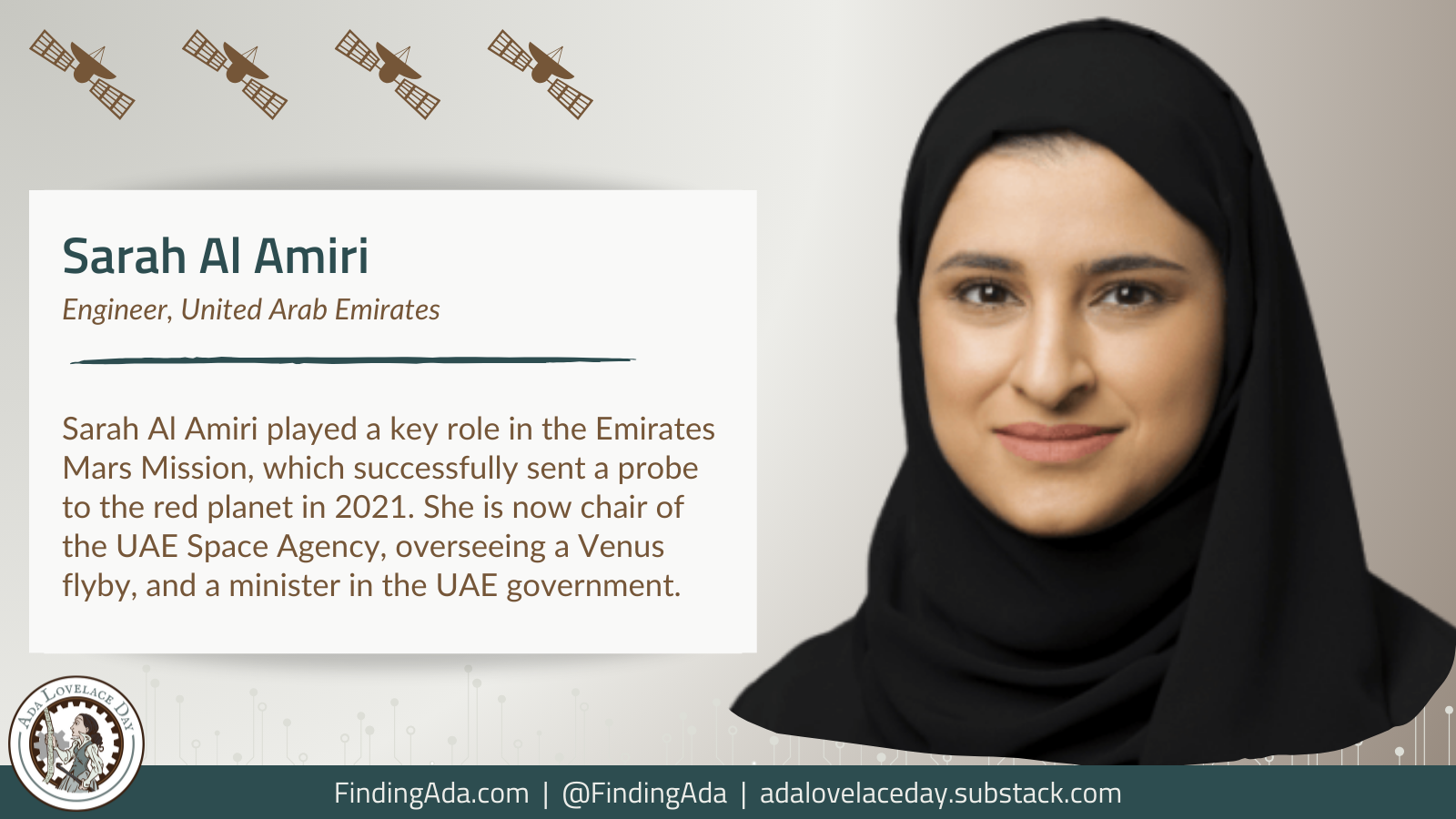Sarah Al Amiri
Sarah bint Yousef Al Amiri, سارة بنت يوسف الأميري, is chair of the the United Arab Emirates (UAE) Space Agency and the UAE Council of Scientists. She played a central role in the historic Emirates Mars Mission, which saw the UAE become the first Arab nation to reach the red planet in 2021.
Born in 1987, Al Amiri grew up in Abu Dhabi. Her fascination with space was sparked at the age of 12 when she saw a photo of the Andromeda galaxy. When she finished school, however, she chose to study computer science at university – believing that “higher education careers or studies in space exploration [was not] a realistic option”, as the UAE did not even have a space programme at the time.
Al Amiris’s career path opened up when she completed her master’s in 2009 and was hired as a software engineer by the Emirates Institution for Advanced Science and Technology (now the Mohammed bin Rashid Space Centre). She would later be promoted to head of research and development, working on the UAE’s first and second Earth observation satellites during her time at the centre.
The United Arab Emirates Space Agency (UAESA) launched in 2014, and Al Amiri established a project that resulted in the successful 24-hour flight of a prototype pseudo-satellite vehicle – reaching the highest altitude of any unmanned aircraft over UAE airspace. The same year, she was named deputy project manager and science lead of Al-Amal (Hope), the UAE’s inaugural Mars mission and its most ambitious space project yet. The goal was to send a probe to Martian orbit by 2021 to coincide with the UAE’s 50th anniversary.
The Mars mission was not Al Amiri’s only focus during these years. She was appointed head of the Emirates Scientist Council in 2016, aged just 29, and in 2017 was given her first post in the UAE government (becoming the cabinet minister responsible for the advanced sciences). A year later, she was made chair of the UAE Council for the Fourth Industrial Revolution, a term used to describe 21st century technological advancements including artificial intelligence (AI), robotics and quantum computing.
The UAE’s Mars mission launched to global fanfare in July 2020. The same month, Al Amiri was appointed chair of UAESA, making her the youngest person ever to lead a space agency. When the Hope spacecraft successfully orbited Mars in February 2021, the UAE became the fifth nation ever to reach the planet.
Some of Hope’s major contributions to science include the sharpest and most precise mapping of a “discrete aurora” on Mars’s nighttime side, and the detection of dramatic variations in atomic oxygen and carbon monoxide in the planet’s dayside atmosphere. The mission has also been significant in terms of gender representation. Women made up 80 per cent of its science team, as well as a relatively high 34 per cent of the mission team.
In May 2022, Al Amiri’s governmental brief was expanded when she was made Minister of State for Public Education and Advanced Technology. She has helped assemble a team focused on women in sciences, addressing what she describes as the “leaky pipeline” that can see women drop out of STEM programmes before beginning their careers. And she is currently overseeing work on the UAE’s next major mission: a flyby of Venus and seven different asteroids, due to launch in 2028.
For her contributions to science, technology and engineering, Al Amiri has been honoured as one of the World Economic Forum’s 50 Young Scientists in 2015; one of the BBC’s 100 Women in 2020; and on the 2021 Time 100 Next list.
You can follow her work here:
Twitter: @SarahAmiri1
Further Reading
- Sarah Al Amiri, Wikipedia
- Sarah Al Amiri, International Astronautical Federation
- Honoring Emirati Women’s Day with our first cover: Sarah Al Amiri, Ashleigh Stewart, Wired, 28 August 2022
- Sarah Al Amiri: The Woman Who Took the U.A.E. to Mars, Jeffrey Kluger, Time, 24 February 2022
- Plane Speaking – HE Sarah Al Amiri, Royal Aeronautical Society, 13 July 2021
- Designed to be disruptive: Leading the development of the first Arab mission to Mars – Sarah Al-Amiri, Chair of the UAE Space Agency, Womanthology, 9 June 2021
- Sarah al-Amiri: The woman leading UAE’s Mars mission, Lewis Sanders IV, DW, 19 July 2020
Written by Moya Crockett, with thanks to Stylist for their support.
